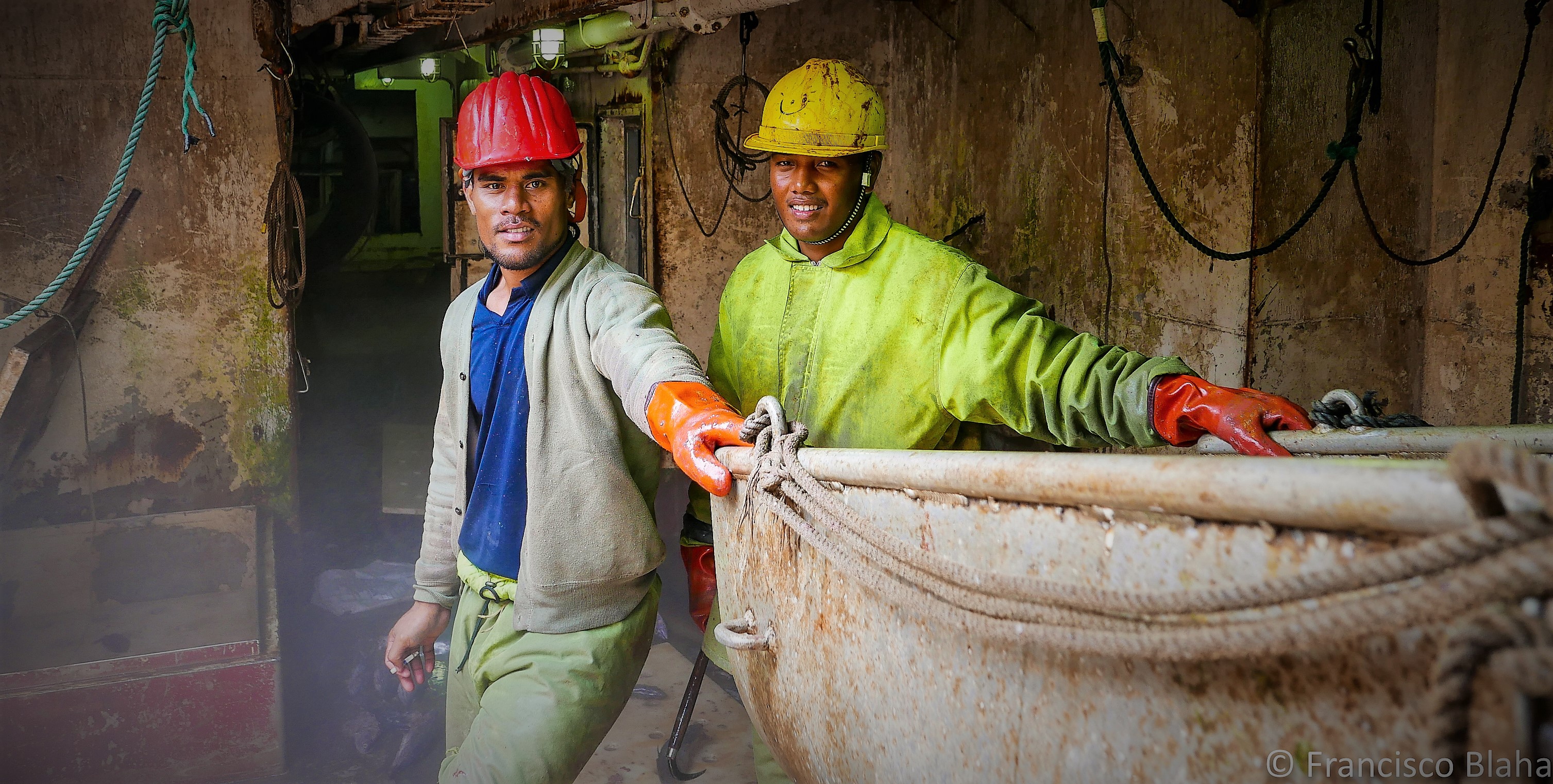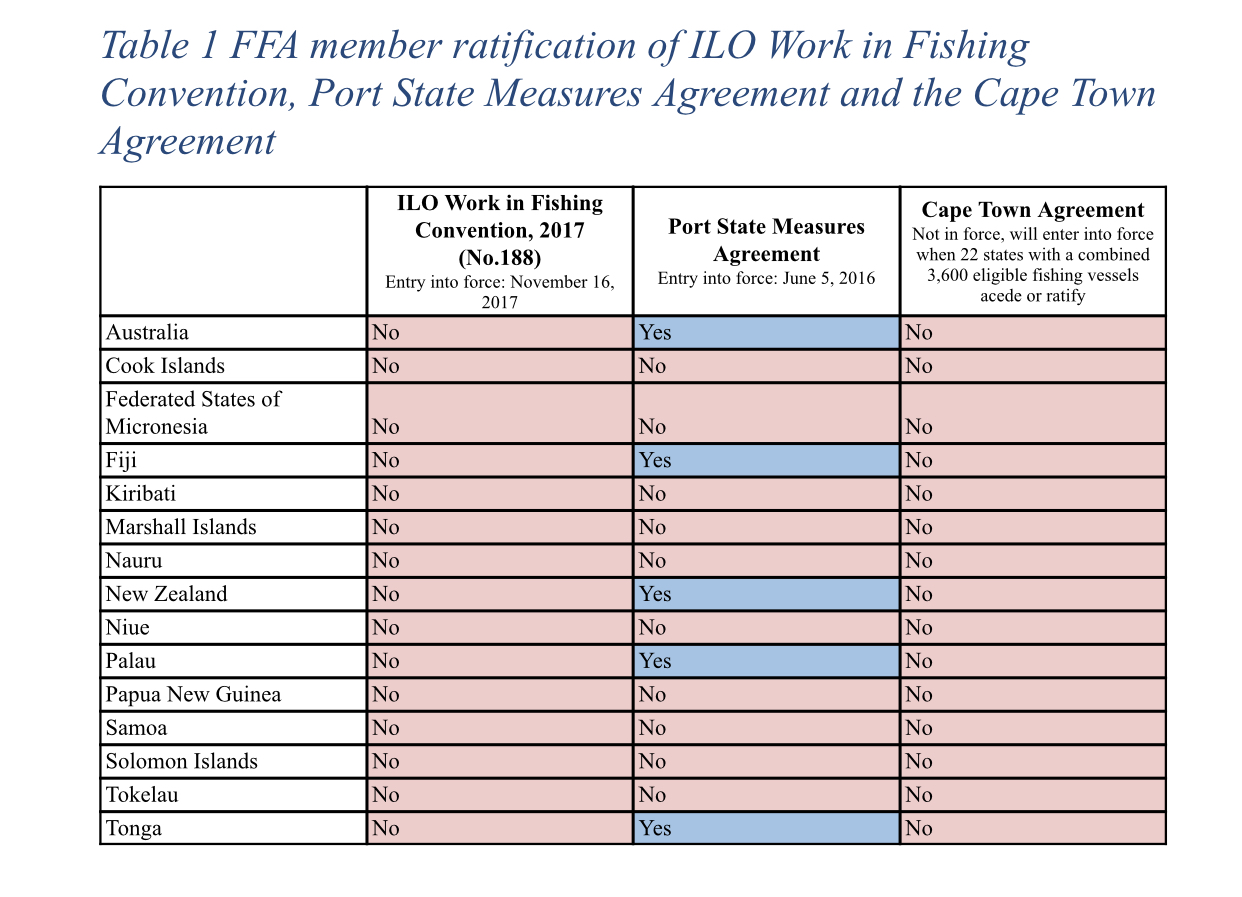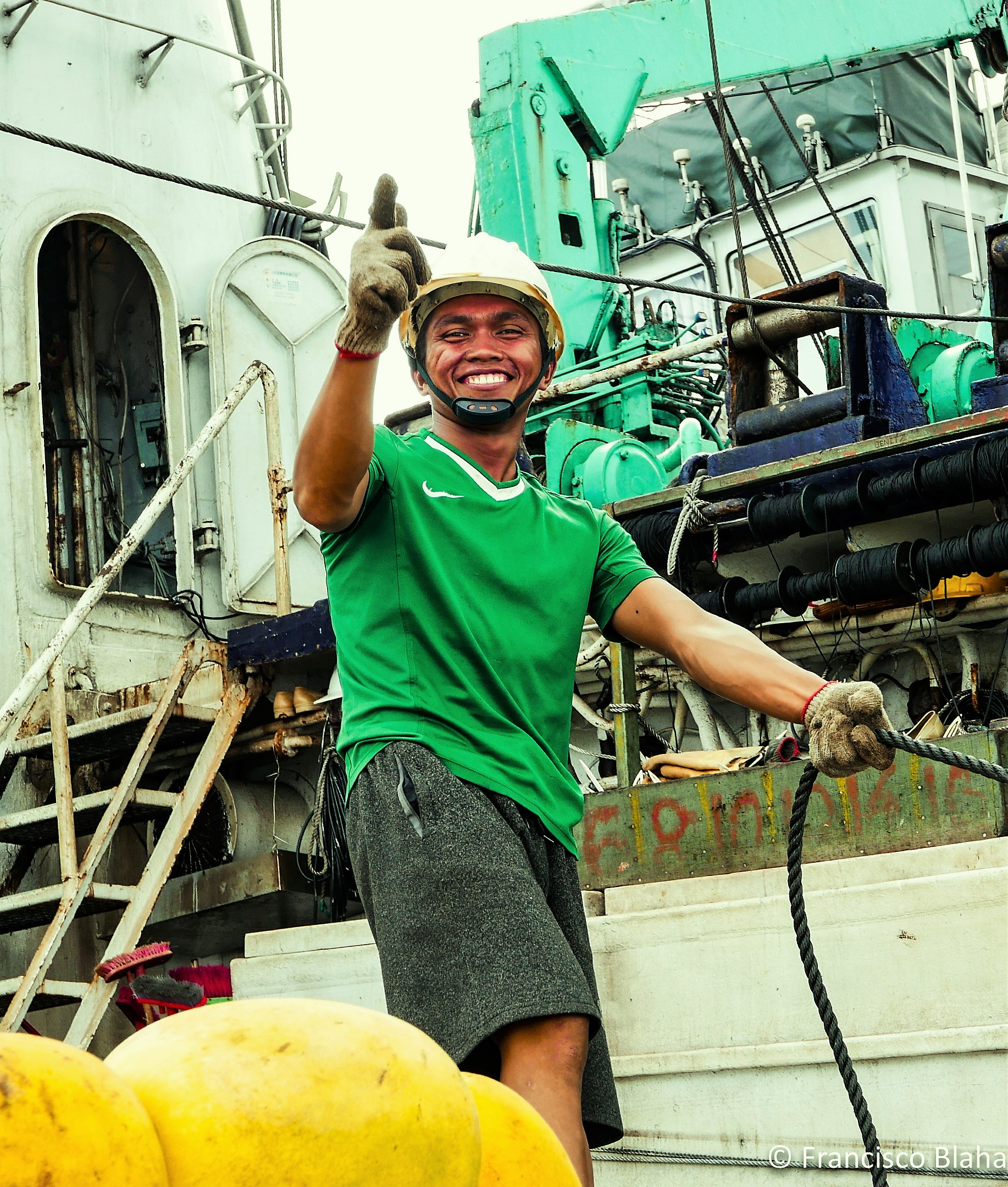Fish stocks around the world are in decline with a large proportion of this decline attributable to the widespread practice of illegal, unreported and unregulated (IUU) fishing. Declining fish stocks result in increased fishing efforts to make up the shortfall of catches and this often leaves fishing vessels operating beyond economic and ecological sustainability. Subsidized fishing fleets often backed by national governments are one way to skirt this economic inconvenience.
Tragically, another alternative is cost-cutting on the human side of commercial fishing. This results in poor working conditions for fishing crew, forced labour, slavery and even human trafficking. This forms a hidden subsidy of sorts for IUU fishing that impacts those directly responsible for catching fish and tainting the seafood that is supplied globally. The Pacific Island Forum Fisheries Agency (FFA) which was established with the mandate to assist Pacific Island Countries manage their fishery resources is taking measures to address this oft-neglected aspect of fisheries.
FFA members lay claim to some of the richest tuna stocks globally. Under the United Nations Convention on the Law of the Sea (UNCLOS) states have sovereign rights to manage their 200 nautical mile Exclusive Economic Zone (EEZ). This means that the right to issue licences and on what terms and conditions lies with these states and within their EEZ. In this legal bulletin we consider how the FFA is implementing a decision of its members to use licence conditions to better regulate working conditions on fishing vessels that operate in its waters.

What is forced labour, modern slavery and human trafficking?
Under the Forced Labour Convention, forced or compulsory labour is defined as “all work or service which is exacted from any person under the threat of a penalty and for which the person has not offered himself or herself voluntarily.” This definition includes traditional practices of forced labour, such as vestiges of slavery or slave-like practices, and various forms of debt bondage, as well as new forms of forced labour, such as human trafficking.
In the fisheries sector, crew are particularly vulnerable to forced labour. This stems from a variety of reasons and include the remoteness of the work with fishing vessels being out at sea at sea and far from home for prolonged periods coupled with lax regulation and oversight by virtue of being flagged to a jurisdiction (Flag State) with poor employment regulations. This can further be exacerbated when the crew are migrant workers who may not speak the same language as their Captain and fellow crew. The United Nations Convention on the Law of the Sea (UNCLOS) imposes a duty on all Flag States to effectively exercise their Flag State jurisdiction. This basically means that Flag States have an obligation to enforce the laws of their country on vessels flying their flag. Flag States who do not meet their obligations undermine international cooperation allowing these types of exploitative conditions to manifest, these States are often known as Flags of Convenience.
FFA’s Minimum Terms and Conditions in relation to crewing employment conditions
Licensing terms and conditions are an important tool in regulating fishing in FFA member EEZs. The terms and conditions are standardised across the FFA member waters through the Harmonised Minimum Terms and Conditions (“MTCs”), providing an effective tool in regulating fishing access to their waters. They implement regional fisheries management requirements and set standards aimed at protecting fisheries resources and maximising benefits from these fisheries resources. MTCs generally cover monitoring, surveillance and control of fishing vessels and establishing fisheries management initiatives.
In May 2019, and following a FFA initiative to consider the specific issue of labour conditions on vessels fishing in its EEZs (which was also deterring Pacific governments encouraging greater employment of Pacific Islanders on fishing vessels), the Forum Fisheries Committee (FFC) adopted amendments to the MTCs. The amendments applied conditions to the employment of crew on foreign fishing vessels that are licenced to fish in the waters of FFA members. These amendments were derived from the ILO Work in Fishing Convention (No. 188) that aims to ensure decent conditions of work with regard to minimum requirements for work on board; conditions of service; accommodation and food; occupational safety and health protection; medical care and social security.
The amendments are made to two parts of the FFA MTCs Annexes. It amends Section 5.2 of Annex 4 Procedures for the Operation of the FFA Vessel Register as it relates to the criteria for withdrawal or suspension of “good standing”. Good standing on FFA’s Vessel Register is a requirement for foreign fishing vessels who wish to be issued with or hold a fishing licence. This amendment indicates that good standing may be suspended if there are reasonable grounds to believe that the vessel violated the terms and conditions of access, by failing to comply with license conditions regulating employment, vessel safety and crew numbers. It then proceeds to list these crew employment conditions. These conditions include obligations where the Operator shall:
- be responsible for the health, welfare and safety of the crew for the duration of their contract
- ensure that a written contract is signed with the crew prior to employment in accordance with the newly included Annex 6 which includes particulars of the crew agreement
- Observe and respect basic human rights of the crew in line with international standards
- Take all reasonable steps to ensure that the crew are not assaulted or subject to torture, cruel, inhumane or degrading treatment and treat all crew with fairness and dignity
- Be responsible for the provision of health protection and management for sickness, injury or death in a work-related capacity
- In the event of a death notify the authorities, preserve the body for an autopsy and arrange for repatriation of the body to the nearest appropriate port
- Notify the crew’s next of kin in the event of an emergency
- Provide decent and regular remuneration to the crew
- Provide repatriation of the crew to point of hire and all related costs
- Ensure the crew is given regular periods of rest
- Be responsible to ensure the vessel is safe in accordance with accepted international standards on vessel safety; the safety of the crew on board and the crew are trained in occupational safety and health awareness
- Provide travel costs, insurance, safety equipment and tools, appropriate habitable accommodation, sanitary facilities and suitable food at no cost to the crew
- Not deduct any crew wages for any expenses related to work
The second part of the MTC amendment adds Annex 6 Particulars of Crew Agreement and provides the minimum details required for crew employment contracts. This includes inter alia, details like the particulars of the crew (name, date of birth, birthplace), next of kin, name of fishing vessel, wages or share basis, benefits, terms for contract termination and rights of repatriation.
Case Study: Fuh Sheng 11
In May 2018, a Taiwanese vessel called the Fuh Sheng 11 became the first vessel apprehended under the ILO Work in Fishing Convention in Cape Town, South Africa. While initially detained because of signs the vessel was unseaworthy, upon inspection a long list of labour conditions on board were discovered and included a lack of documentation, poor accommodation, insufficient food, and poor safety and health conditions on board. Taiwanese authorities failed to sanction the vessel initially, however after further investigation by the Environmental Justice Foundation, where the crew reported physical abuse and shark finning, Taiwanese authorities eventually sanctioned the vessel. Subsequent investigations uncovered forced labour and other forms of illegal fishing include shark finning and killing of turtles and dolphins on other Taiwanese flagged vessels.
Conclusions and Recommendations
The above case is relevant because it shows the connection between forced labour, IUU fishing and vessel safety and the need for increased and harmonised port state control and inspection, and the effective exercise of Flag State responsibility to detect and enforce against IUU fishing and other related crimes. While this case study may feature foreign vessels, it is important to note that countries like Fiji are frequently visited by many of these foreign flagged vessels. In Fiji, for example, 94% of all foreign fishing fleets that visit our ports are either Chinese, Taiwanese or Korean. This exposure also increases the external risk of forced labour abuses happening in our waters. Without robust port measures geared towards identifying the signs of exploitative conditions much like those advocated by FFA MTCs, the chance of casting a blind eye to these offences happening so close to home are very likely.
Beyond this, there is more that we can do in terms of increasing transparency in the fisheries sector. This includes understanding who is ultimately responsible for IUU fishing and forced labour practices. Onshore Ultimate Beneficial Owners, or shareholders who hide behind multiple shell companies need to be identified and linked to the illegal activities that they perpetuate at sea through their investments and the profits that they reap. Flags of convenience and ports of convenience are another avenue through which bad faith operators engage and survive. The lack of regulation and enforcement creates a black hole for illegally caught fish and the associated crimes.
It is clear from the Fuh Sheng 11 case that instances of forced labour, IUU fishing and vessel safety are linked and this brings on a corresponding need for a multi-pronged effort that addresses this complex but intrinsically connected problem. There are three international instruments that address these three issues in the fisheries sector. For forced labour there is the ILO Work in Fishing Convention, for IUU fishing there is the Port States Measures Agreement, and for vessel safety there is the Cape Town Agreement.
The following is a table showing the state for ratification in the Pacific.

Note for the ILO Work in Fishing Convention and the Port State Measures Agreement, equivalent measures are currently being developed regionally via FFA. In the case of the former it is via the latest amendments to the MTC’s on crewing employment conditions. In the case of the latter, this will be done through the New Zealand Government funded Pacific Islands Port State Measures Project under which a regional port State measures framework was endorsed at the 110th Annual Officials Forum Fisheries Committee Meeting (FFC110) in May this year.
It should be further noted, that the cases of Australia and New Zealand are different because Australia’s fishing fleet capacity is such that it is not obliged to licence foreign vessels to fish in its EEZ, as it is able to capture up to its own Total Allowable Catch. In the case of New Zealand, it introduced legislation in 2014 requiring any foreign fishing vessel that wants a licence to fish in NZ’s EEZ to reflag its vessel to NZ thus submitting to the jurisdiction of NZ law, including labour conditions.
For the MTCs to work effectively it is necessary for a few things to happen, first, all FFA members have to implement the MTCs via local laws or as a condition of fishing licences. This is to ensure that they have the power to enforce any breach of nationally implemented licence conditions. As well as this there will need to be discussion and technical training across enforcement agencies and their regional partners to work together to enforce the MTCs. It is notable that FFA is providing assistance on training and implementation of MTCs in the region to support these efforts. Further, all FFA Member States must cooperate in sharing information particularly in identifying foreign vessels in breach of MTCs warranting a suspension of good standing.

Contact:
Kevin Chand (Stanford Center for Ocean Solutions) kevinfj@stanford.edu
James Sloan (Siwatibau and Sloan) james@sas.com.fj
With thanks to: the experts who reviewed a copy of this legal bulletin and who provided comments and suggestions to improve it.
Photos by: Francisco Blaha http://www.franciscoblaha.info/



